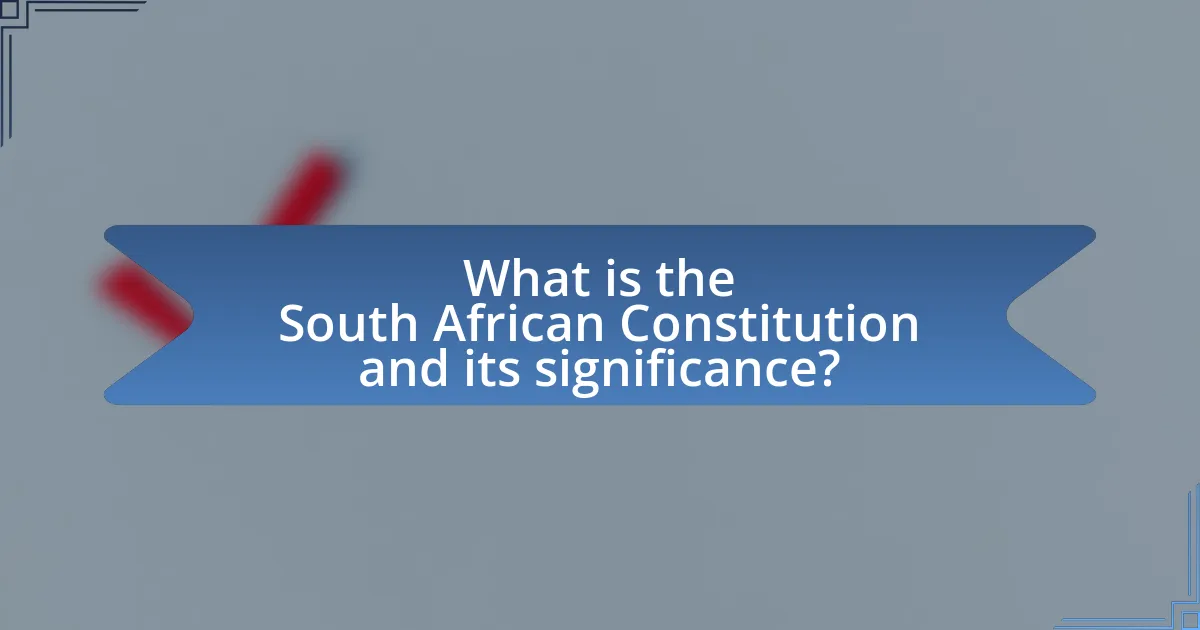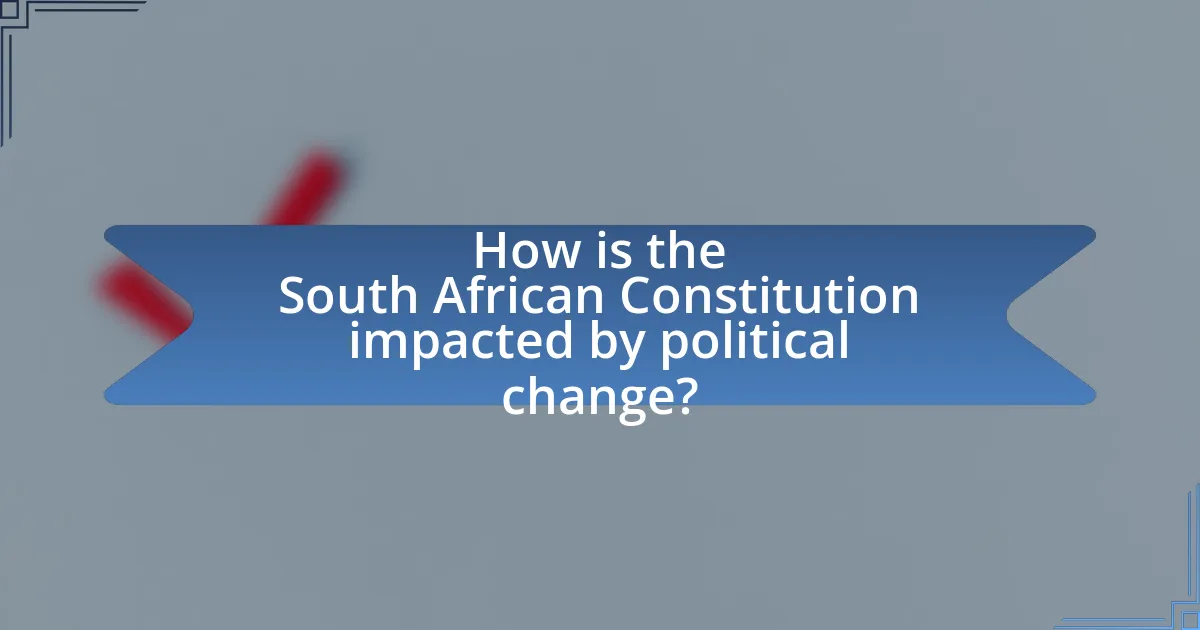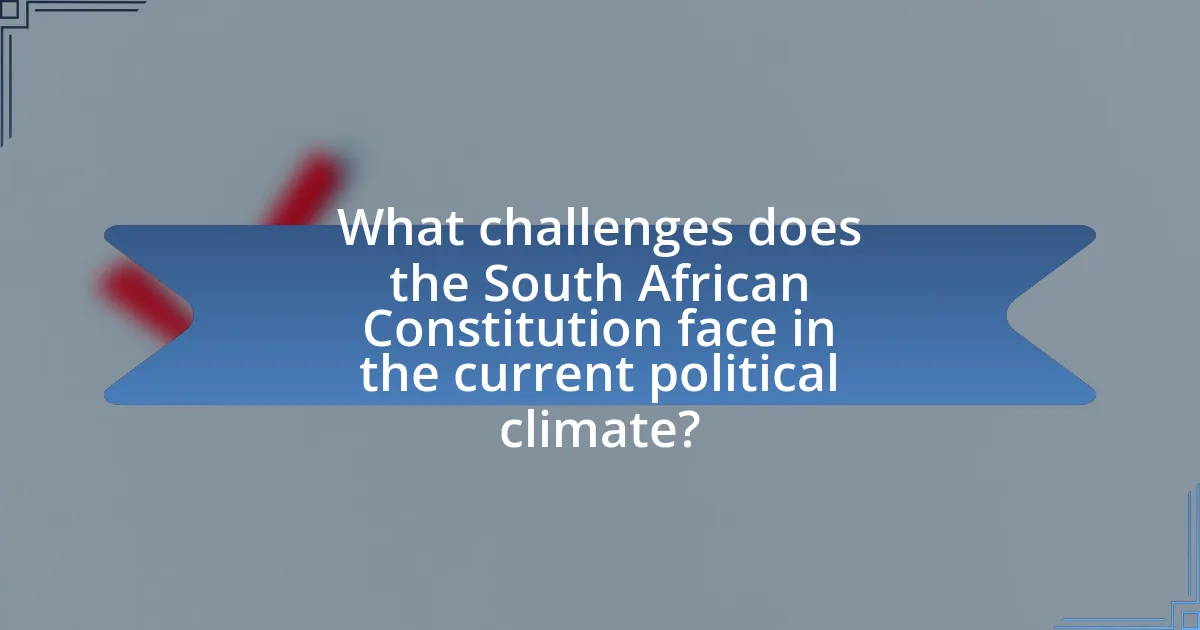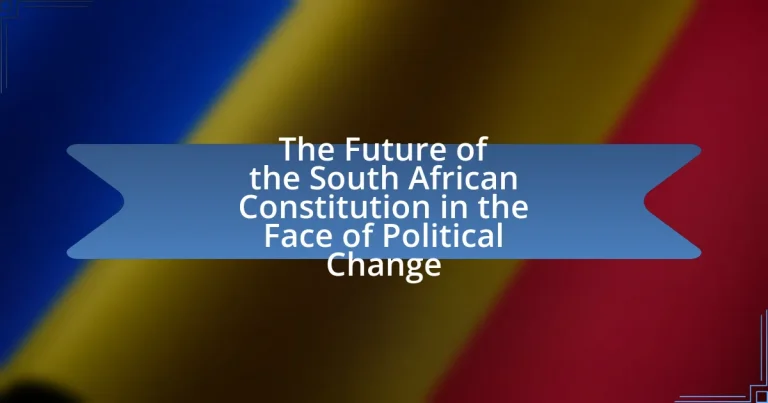The South African Constitution, enacted in 1996, serves as the supreme law of the nation, establishing a framework for governance and the protection of human rights. This article examines the Constitution’s significance in promoting democracy, equality, and justice, as well as its evolution through amendments and judicial interpretations in response to changing societal values. It explores the historical events that influenced its creation, the key principles enshrined within it, and the challenges it faces in the current political climate, including corruption and social inequality. Additionally, the article discusses the role of political parties, civil society organizations, and citizen engagement in shaping constitutional discourse and ensuring the Constitution remains relevant amidst ongoing political changes.

What is the South African Constitution and its significance?
The South African Constitution is the supreme law of South Africa, enacted in 1996, which establishes the framework for governance and the protection of human rights. Its significance lies in its role as a cornerstone of democracy, promoting equality, freedom, and justice while ensuring that all citizens are treated with dignity. The Constitution also includes a Bill of Rights that guarantees fundamental rights and freedoms, reflecting the country’s commitment to rectify past injustices and foster social cohesion. This legal document has been pivotal in shaping South Africa’s political landscape, guiding the nation through its transition from apartheid to a democratic society.
How has the South African Constitution evolved since its inception?
The South African Constitution has evolved significantly since its inception in 1996, primarily through amendments and judicial interpretations that reflect changing societal values and political dynamics. Initially established to dismantle apartheid and promote human rights, the Constitution has undergone amendments, such as the 2013 amendment to the Electoral Act, which aimed to enhance electoral processes. Additionally, the Constitutional Court has played a crucial role in interpreting the Constitution, ensuring that it adapts to contemporary issues, such as land reform and social justice, thereby reinforcing its relevance in a changing political landscape.
What historical events influenced the creation of the South African Constitution?
The creation of the South African Constitution was significantly influenced by the end of apartheid, the negotiations for a democratic transition, and the establishment of a multi-party democracy. The apartheid regime, which enforced racial segregation and discrimination, faced increasing internal resistance and international condemnation, leading to its eventual dismantling in the early 1990s. Key events such as the release of Nelson Mandela in 1990 and the subsequent negotiations at the Convention for a Democratic South Africa (CODESA) culminated in the adoption of the interim constitution in 1993, which laid the groundwork for the final constitution adopted in 1996. These historical milestones reflect the collective struggle for equality and human rights, shaping the constitutional framework that emphasizes democracy, justice, and the rule of law.
How does the Constitution reflect the values of South African society?
The South African Constitution reflects the values of South African society by enshrining principles of equality, human dignity, and social justice. These values are evident in the Constitution’s Bill of Rights, which guarantees fundamental rights such as freedom of expression, the right to education, and protection against discrimination. The Constitution was adopted in 1996, following the end of apartheid, and it embodies the collective aspiration for a democratic society that respects diversity and promotes inclusivity. The commitment to non-racialism and non-sexism is explicitly stated, reinforcing the societal values of unity and respect for all individuals, regardless of their background. This alignment with societal values is further supported by the Constitutional Court’s rulings, which often emphasize the importance of human rights and social justice in interpreting the law.
What are the key principles enshrined in the South African Constitution?
The key principles enshrined in the South African Constitution include human dignity, equality, and freedom. These principles establish a foundation for a democratic society, emphasizing the protection of individual rights and the promotion of social justice. The Constitution guarantees the right to equality before the law, prohibits discrimination, and affirms the right to life, privacy, and freedom of expression. Additionally, it enshrines the rule of law and the separation of powers, ensuring that government authority is exercised within a framework of accountability and transparency. These principles are vital for upholding democracy and protecting citizens’ rights in South Africa.
What rights and freedoms are guaranteed by the Constitution?
The Constitution guarantees fundamental rights and freedoms, including the right to equality, freedom of expression, and the right to privacy. Specifically, the Bill of Rights enshrines these rights, ensuring that all individuals are treated equally before the law and have the freedom to express their opinions without fear of reprisal. Additionally, it protects personal privacy and family life, reflecting South Africa’s commitment to human dignity and democratic values. These rights are essential for fostering a just society and are legally enforceable, providing a framework for addressing violations.
How does the Constitution ensure the separation of powers?
The Constitution ensures the separation of powers by establishing three distinct branches of government: the executive, the legislative, and the judiciary. Each branch has its own powers and responsibilities, preventing any single branch from gaining excessive authority. For instance, the legislative branch creates laws, the executive branch enforces them, and the judiciary interprets them. This framework is designed to create a system of checks and balances, where each branch can limit the powers of the others, thereby safeguarding against tyranny and abuse of power. The South African Constitution explicitly outlines these roles in its text, reinforcing the principle of separation of powers as a fundamental aspect of governance.

How is the South African Constitution impacted by political change?
The South African Constitution is significantly impacted by political change as shifts in governance can lead to amendments or reinterpretations of constitutional provisions. For instance, the political landscape post-1994 has seen various parties advocating for changes that reflect their ideologies, such as land reform policies that challenge property rights enshrined in the Constitution. Additionally, the Constitutional Court has played a crucial role in interpreting the Constitution in light of political developments, ensuring that fundamental rights are upheld despite changing political contexts. This dynamic relationship illustrates how political change can directly influence constitutional stability and the protection of rights within South Africa.
What recent political changes have occurred in South Africa?
Recent political changes in South Africa include the election of a new president, Cyril Ramaphosa, who has focused on anti-corruption measures and economic reforms since taking office in 2018. His administration has faced challenges such as high unemployment rates, energy crises, and public discontent, leading to significant political discourse around constitutional amendments and land reform policies. The African National Congress (ANC), the ruling party, has also experienced internal strife and declining support, prompting discussions about its future direction and the potential impact on the South African Constitution.
How have these changes affected public perception of the Constitution?
Changes in political dynamics and governance in South Africa have significantly altered public perception of the Constitution. Many citizens now view the Constitution as a living document that must adapt to contemporary challenges, reflecting a desire for greater accountability and responsiveness from government institutions. For instance, the rise of social movements advocating for land reform and economic justice has led to increased scrutiny of constitutional provisions, with many arguing that the Constitution should prioritize social equity. This shift is evidenced by public opinion surveys indicating a growing belief that the Constitution should evolve to better address issues of inequality and corruption, highlighting a demand for reforms that align constitutional principles with the realities faced by South Africans today.
What role do political parties play in shaping constitutional discourse?
Political parties significantly influence constitutional discourse by framing debates, shaping public opinion, and advocating for specific constitutional interpretations. In South Africa, political parties engage in discussions about constitutional amendments, rights protections, and governance structures, reflecting their ideological positions. For instance, the African National Congress (ANC) has historically emphasized social justice and equality, which informs its approach to constitutional issues, while opposition parties like the Democratic Alliance (DA) advocate for different interpretations focused on economic freedom and individual rights. This dynamic interaction between parties and constitutional discourse is evident in legislative processes, public debates, and judicial appointments, where party ideologies directly impact the evolution of constitutional norms and practices.
Why is the Constitution considered a living document?
The Constitution is considered a living document because it is designed to adapt to changing societal values and circumstances. This adaptability is evident in its provisions for amendments, which allow for legal and social evolution over time. For instance, the South African Constitution includes a Bill of Rights that reflects contemporary human rights standards, demonstrating its responsiveness to the needs of a diverse population. Additionally, judicial interpretations by the Constitutional Court have expanded the application of constitutional principles, further illustrating its dynamic nature in addressing modern issues.
How does the Constitution adapt to changing political landscapes?
The South African Constitution adapts to changing political landscapes through its provisions for amendment and interpretation. The Constitution allows for amendments to be made by a two-thirds majority in Parliament, enabling it to evolve in response to new political realities and societal needs. For instance, the Constitutional Amendment Act of 1996 reflects changes in governance and human rights, demonstrating the Constitution’s flexibility. Additionally, the Constitutional Court plays a crucial role in interpreting the Constitution, ensuring that its application remains relevant as political contexts shift, as seen in landmark cases like the Glenister v. President of the Republic of South Africa, which addressed issues of corruption and accountability. This adaptability is essential for maintaining democratic principles and protecting citizens’ rights amid evolving political dynamics.
What mechanisms exist for constitutional amendments?
The mechanisms for constitutional amendments in South Africa include parliamentary approval and a national referendum. Specifically, amendments can be initiated by either the National Assembly or the National Council of Provinces, requiring a two-thirds majority in the National Assembly or a majority in the National Council of Provinces for certain amendments. Additionally, some amendments may necessitate a national referendum, particularly those affecting fundamental rights or the structure of government. This process is outlined in Chapter 1 of the South African Constitution, which emphasizes the importance of broad consensus in altering the constitutional framework.

What challenges does the South African Constitution face in the current political climate?
The South African Constitution faces significant challenges in the current political climate, primarily due to issues of political instability, corruption, and social inequality. Political instability is evident in the frequent leadership changes within the ruling party, which undermine the consistency and effectiveness of constitutional governance. Corruption has been highlighted in various reports, including the Zondo Commission, which revealed extensive state capture that erodes public trust in institutions designed to uphold the Constitution. Additionally, social inequality remains a pressing issue, as economic disparities continue to challenge the realization of constitutional rights for all citizens, particularly in marginalized communities. These factors collectively threaten the integrity and implementation of the South African Constitution.
What are the threats to constitutional democracy in South Africa?
The threats to constitutional democracy in South Africa include corruption, political instability, and erosion of the rule of law. Corruption has been pervasive, particularly within government institutions, undermining public trust and accountability. Political instability, often fueled by factionalism within the ruling party, disrupts governance and policy implementation. Additionally, the erosion of the rule of law is evident in instances where political leaders have attempted to undermine judicial independence, as seen in various high-profile cases where the judiciary’s decisions were challenged. These factors collectively jeopardize the foundational principles of democracy established in the South African Constitution.
How do corruption and governance issues undermine the Constitution?
Corruption and governance issues undermine the Constitution by eroding the rule of law and diminishing public trust in governmental institutions. When officials engage in corrupt practices, they violate constitutional principles that promote accountability and transparency, leading to a lack of adherence to legal frameworks. For instance, the 2016 State Capture report in South Africa highlighted how corruption infiltrated state institutions, compromising their ability to function effectively and uphold constitutional mandates. This erosion of institutional integrity results in weakened enforcement of laws and policies, ultimately threatening the constitutional order and democratic governance.
What impact do social movements have on constitutional integrity?
Social movements significantly influence constitutional integrity by advocating for the protection and expansion of rights, often leading to legal reforms and amendments. For instance, in South Africa, movements such as the anti-apartheid struggle played a crucial role in shaping the Constitution, ensuring it embodies principles of equality and human rights. The ongoing activism surrounding issues like land reform and social justice continues to challenge and refine constitutional interpretations, demonstrating that social movements can both uphold and transform constitutional frameworks to reflect the evolving values of society.
How can the Constitution be defended against political manipulation?
The Constitution can be defended against political manipulation through robust judicial review and active civic engagement. Judicial review allows courts to assess the constitutionality of legislative and executive actions, ensuring that any political maneuvering that undermines constitutional principles is challenged. For instance, the Constitutional Court of South Africa has played a critical role in upholding constitutional rights and principles, as seen in cases like the 2016 ruling on the public protector’s powers, which reinforced the independence of oversight institutions. Additionally, civic engagement, including public awareness campaigns and advocacy by civil society organizations, empowers citizens to hold political leaders accountable and demand adherence to constitutional norms. This dual approach of judicial oversight and civic participation creates a framework that deters political manipulation and preserves the integrity of the Constitution.
What role do civil society organizations play in protecting constitutional rights?
Civil society organizations play a crucial role in protecting constitutional rights by advocating for accountability, promoting awareness, and providing legal support to marginalized communities. These organizations often engage in monitoring government actions, challenging unconstitutional laws, and mobilizing public opinion to safeguard individual freedoms. For instance, in South Africa, organizations like the Legal Resources Centre have successfully litigated cases that uphold constitutional rights, demonstrating their effectiveness in influencing legal outcomes and policy changes. Their efforts contribute to a robust civil society that holds the government accountable and ensures that constitutional protections are upheld in the face of political change.
How can citizens engage in constitutional advocacy?
Citizens can engage in constitutional advocacy by participating in public forums, joining advocacy groups, and utilizing social media to raise awareness about constitutional issues. Public forums allow citizens to voice their opinions and influence policymakers directly, while advocacy groups provide structured platforms for collective action and education on constitutional rights. Social media serves as a powerful tool for mobilizing support and disseminating information quickly, enabling citizens to connect with a broader audience and advocate for constitutional protections. These methods have been effective in various contexts, such as the South African constitutional debates, where citizen engagement has historically shaped legal reforms and public policy.
What are the best practices for ensuring the Constitution remains relevant?
To ensure the Constitution remains relevant, it is essential to engage in continuous public education and awareness campaigns about constitutional rights and responsibilities. This practice fosters an informed citizenry that actively participates in democratic processes, thereby reinforcing the Constitution’s significance in everyday life. Historical examples, such as the post-apartheid era in South Africa, demonstrate that public engagement and education can lead to greater respect for constitutional principles and increased accountability from government officials. Additionally, regular reviews and amendments to the Constitution, in response to societal changes and needs, help maintain its applicability and relevance over time. This approach is supported by the South African Constitutional Court’s rulings, which emphasize the need for the Constitution to evolve alongside the society it governs.
How can education about the Constitution be improved in South Africa?
Education about the Constitution in South Africa can be improved by integrating comprehensive civic education into the national curriculum. This approach ensures that students from an early age understand their rights and responsibilities as citizens, fostering a culture of constitutional awareness. Research indicates that countries with robust civic education programs, such as Finland, show higher levels of civic engagement and understanding of constitutional principles. Additionally, utilizing interactive teaching methods, such as debates and role-playing, can enhance engagement and retention of constitutional knowledge among students. Implementing community outreach programs that involve local leaders and legal experts can also provide practical insights into the Constitution’s relevance in everyday life, thereby reinforcing its importance in a democratic society.
What strategies can be employed to promote constitutional literacy among citizens?
To promote constitutional literacy among citizens, strategies such as integrating constitutional education into school curricula, conducting community workshops, and utilizing digital platforms for outreach can be employed. Integrating constitutional education in schools ensures that students learn about their rights and responsibilities from an early age, fostering a culture of awareness and engagement. Community workshops can provide interactive learning experiences, allowing citizens to discuss and understand constitutional issues relevant to their lives. Additionally, digital platforms, including social media and educational websites, can disseminate information widely and engage younger audiences, making constitutional concepts more accessible. These strategies have been shown to increase public understanding of constitutional rights, as evidenced by initiatives in various countries that have successfully enhanced civic engagement through targeted educational programs.


